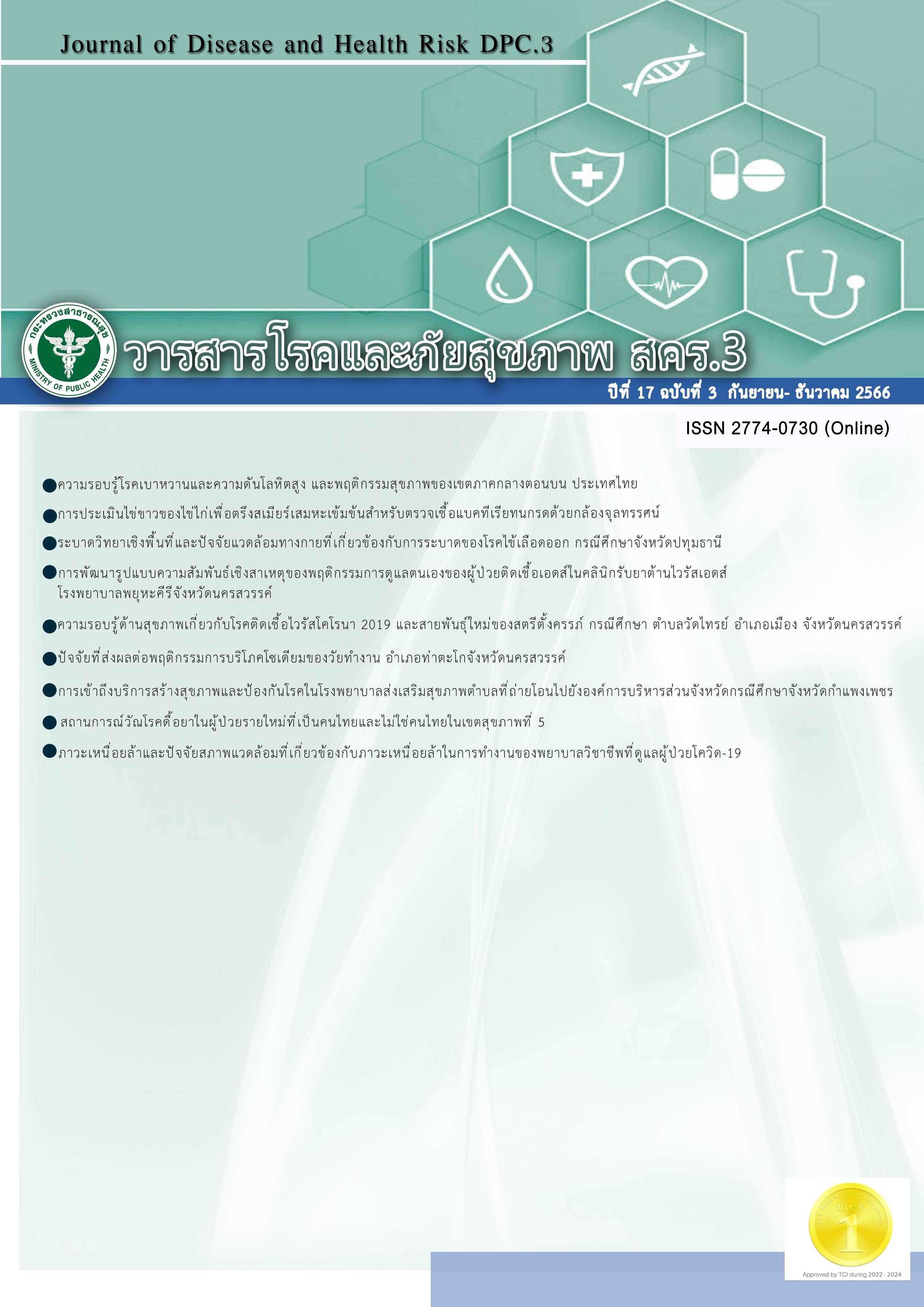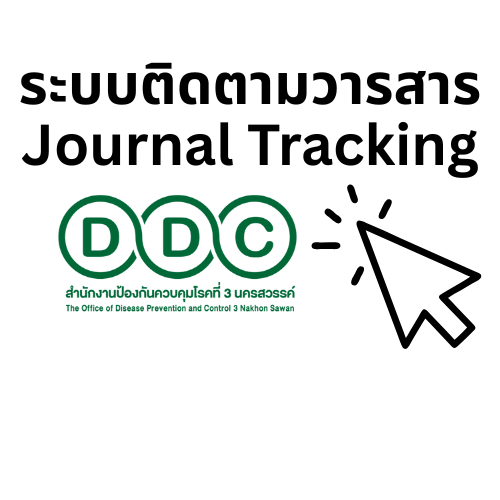Health Literacy About Coronavirus Disease 2019 and New Strains among Pregnant Women: A Case Study of Wat Sai Sub-district, Muang District Nakhon Sawan Province
Keywords:
Health Literacy, Coronavirus 2019 Disease, Pregnant WomenAbstract
Health literacy is important for pregnant women because it shows that they have the knowledge to prevent risk. Have standards for taking care of yourself and your children and can face the problem of coronavirus disease 2019 well. This research is a descriptive correlational was to study the levels of health literacy and the relationship between personal factors and health literacy about coronavirus disease 2019 and new strains among nineteen pregnant women. These pregnant women stayed in Wat Sai Sub-district, Muang District, Nakhon Sawan Province. Collecting data using the health literacy questionnaire. The data were analyzed using descriptive statistics, the Point biserial correlation coefficient, and the Spearman rank correlation coefficient. The results revealed that 1) pregnant women had an overall average level of health literacy about coronavirus disease 2019, and the new strains were as high as 3.99 (S.D.=0.11). The average level of six health literacy such as information access (4.11±0.10), information understanding (4.17±0.12), questioning (3.91±0.14), decision-making skill (3.97±0.14), behavioral practices (3.87±0.09) and word of mouth (3.87±0.16). and 2) The correlation between personal factors and health literacy found that the channels for receiving information were significantly related to health literacy in behavioral practice (r=0.57, p<.01) and in terms of word of mouth (r=0.50, p<.05) These results use to develop health literacy to promote care behaviors and protect themselves and their families from coronavirus disease 2019 or the new strains.
References
World Health Organization. WHO Coronavirus (COVID-19) [Internet]. [15 January 2021]. Available from: https://covid19. who. Int.
Emergency Operations Center, Department of Disease Control. Report on the Situation of Coronavirus Disease 2019. [Internet]. 2021 [Accessed September 20, 2022]. Available from https://ddc.moph.go.th/(in Thai).
Health Promotion Center, Department of Health. Analysis of the Maternal Mortality Situation in Thailand for the 6 Months Following the Fiscal Year 2022 [Internet]. 2021 [Accessed September 20, 2023]. Available from https://hp.anamai.moph.go.th/webupload/4xceb3b571ddb70741ad132d75876bc41d/(in Thai).
Subbaraman N. Pregnancy and COVID: what the data say. Nature. 2021;591(7849):193-5.
Renkert S, Nutbeam D. Opportunities to improve maternal health literacy through antenatal education: an exploratory study. Health promotion international. 2001;16(4):381-8.Z.(in Thai).
Sininat Voraphok, Amporn Rattinthorn, Piyannan Limruangrong. Factors Influencing Knowledge on Maternal Health among Pregnant Women. The Journal of the Nursing Council. 2020 ;35 (1):86-98.
Natthaphon Uthaitham, Naphaphon Ketthong, Nuphon Somchai. Factors Predicting Health Literacy ofPregnantWomen. Journal of Prachomklao College of Nursing, Phetchaburi Province, 2021; 4(2) : 53-65. (in Thai).
Rapiiporn Kwanphrom, Jantarattan Jerasanti, Panpilai Sriapran. Knowledge of Health and Exercise Behavior among Pregnant Women. Nursing Journal. 2021;48(1):210-21.
Dogan M, Ozdemir F. The Relationship Between the Health Literacy Level of Pregnant Women and COVID-19 Knowledge, Attitudes and Behaviors. Sakarya Tıp Dergisi. 2021;11(3):533-41.
Nutbeam D. Health literacy as a public health goal: a challenge for contemporary health education and communication strategies into the 21st century. Health Promotion International. 2000;15(3):259-67.
Boonchom Srisaad. Preliminary Research. (10th Edition). Bangkok: Suwiriyasarn, 2017.
Panom Khleechaya. Accessing, Understanding, Assessing, and Using Health Information to Safely Manage Emerging Infectious Diseases Imported from Overseas Among Urban Residents. Nonthaburi: Health Systems Research Institute, 2018.
Jirapha Khamphisut. Health Knowledge and COVID-19 Prevention Behaviors among Students of the Faculty of Science, Northern College. 2021;7(4):17-28.
Paweenaa Surinprateep, Amporn Rattinthorn, and Piyannan Limruangrong. Factors Influencing the Seeking of Health Information among Pregnant Women. 2019;34(4):95-107.
Naigaga M, Guttersrud O, Pettersen K. Measuring maternal health literacy in adolescents attending antenatal care in a developing country–the impact of selected demographic characteristics. Journal of Clinical Nursing. 2015;24(17-18):2402-9.
Taheri S, Tavousi M, Momenimovahed Z, Direkvand-Moghadam A, Rezaei N, Sharifi N, Taghizadeh Z. Determining health literacy level and its related factors among pregnant women referred to medical and health centers of Tehran in 2019: A cross-sectional study. Shiraz E-Medical Journal. 2021;22(10):1-7.
Janraya Kaewjai-boon, Dolrudee Petchakwaeng, Titaya Kawila, Warrantsorn Panwong, Kalya Jansuk. Factors Associated with COVID-19 Prevention Behaviors among Pregnant Women. 2023; 29(2):e262729.
Cho J, Park D, Lee H E. Cognitive factors of using health apps: Systematic analysis of
relationships among health consciousness, health information orientation, eHealth literacy, and health app use efficacy. J Med Internet Res. 2014;16(5):e125, doi:10.2196/jmir.3283
Downloads
Published
How to Cite
Issue
Section
License
Copyright (c) 2023 Journal of Disease and Health Risk DPC.3

This work is licensed under a Creative Commons Attribution-NonCommercial-NoDerivatives 4.0 International License.
Copyright notice
Article published in the Journal of Disease and Health Risk DPC.3 Nakhon Sawan. It is considered a work of academic research and analysis as well as the personal opinion of the author. It is not the opinion of the Office of Disease Prevention and Control 3, Nakhon Sawan. Or the editorial team in any way Authors are responsible for their articles.
Privacy Policy
Name, address and e-mail address specified in the Journal of Disease and Health Risk DPC.3 Nakhon Sawan. It is used for identification purposes of the journal. And will not be used for any other purpose. Or to another person.









